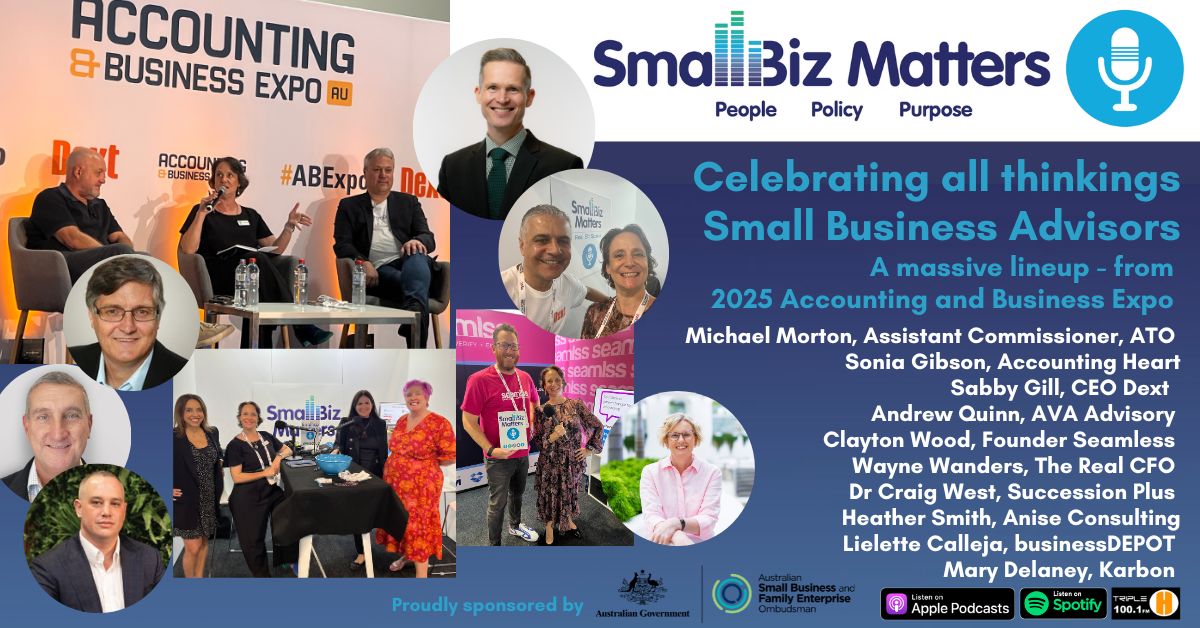I'm a small business so why do I need legal counsel?
| Tuesday November 26Small Biz Matters – a half hour program each week where you can work ON your business rather than IN it.
with Alexi Boyd, broadcaster, advocate and small business owner.
Date: 26 November 2019
We talk a lot on the program about surrounding ourselves with good advisors. We develop good relationships with financial and marketing advisors but why is it legal counsel, which is so important, is left until you really, really need it?
One aspect which is often neglected when setting up a business is that of contractual law. And too many times small business relies on a handshake or good faith as the basis for those contractual relationships and it’s here we can come undone!
Today we are in conversation with Ursula Hogben, co-founder of LegalVision & co-founder of Zero Emissions Sydney North Incorporated now assisting in sustainable development. She's going to help us to learn about the importance of good legal counsel and NOT when you need it most.
Welcome to the show Ursula.
Intro
- A corporate and capital raising lawyer at Baker McKenzie, then a Director at Bank of America Merrill Lynch, for 15 years
- A co-founder of LegalVision, an innovative fast-growing tech-based law firm for 5 years
- Ursula now assists sustainable development businesses, and is the co-founder of Zero Emissions Sydney North Incorporated, to accelerate our transition to net zero emissions
3 areas:
- The importance of key contracts for a business
- The importance of protecting intellectual property
- A recent innovative sustainable development project in our area – the 4 Pines community solar project
- The importance of key contracts for a business
Why are any legal contracts needed?
Legal contracts are an investment in the smooth running and growth of your business.
What are the key types of contracts required?
(i) Your website
(ii) Your clients or customers
(iii) Your company’s interaction with third parties – eg Manufacturer, Distributor
(iv) Your employees and contractors
(i) Website contracts
What are website contracts, why needed?
Privacy Policy: If your business has an annual turnover of over $3 million, or if you are a small business with an annual turnover of $3 million or less and you meet certain criteria, you are legally required to have a Privacy Policy. Even if the Privacy Act 1988 (Cth) does not apply to your business, it is prudent to have a Privacy Policy in place so that your customers are clear on what personal information you are collecting about them and how you will use and disclose it.
Website Terms of Use: To protect your website IP. To explain your content is not advice, and you cannot be sued for it.
(ii) Clients or customers contracts
Why do you need these, doesn’t the consumer law cover this?
Once you operate a business, you establish a legal relationship with your clients or customers, even if you do not have anything in writing. The consumer law applies, and this generally protects and benefits the client.
One key reason for you to have written terms, is to add terms that benefit your business. For example, a client can obtain a refund if a product is faulty. You can specify what is permissible use, and what is not permissible use. For example, a water resistant phone cannot be fully submerged in water.
Another is to provide clarity. You can set out the circumstances for refunds or exchange, and the procedure. It is worth noting that there is no legal requirement to refund or exchange for change of mind, However many shops do including online clothes shops. They specify the address, the need to include all packaging and tags, and the requirement for goods to be unworn.
What are the two primary client and customer legal documents?
(i) Client agreements - primarily used for service-based businesses.
(ii) Sales Terms and Conditions - primarily used for goods-based businesses including e-commerce stores, retail stores, and manufacturers
Client Agreements outline details of the services you are providing and the manner at which you will be providing these services.
- Details of the scope of work;
- Timeline;
- Pricing and Invoicing;
- Indemnity and liability;
- Warranties and consumer guarantees; and
- Dispute resolution
Sales Terms and Conditions common clauses in include:
- Product details;
- Delivery (particularly for online-based businesses or businesses that sell big-ticket items such as fridges, furniture, etc.);
- Payment terms;
- Consumer warranties and Australian Consumer Law provisions; and
- Refunds and returns.
(iii) Your company’s interaction with third parties – eg Manufacturer, Distributor
What are some examples and why are these needed?
Manufacturing: The Manufacturing Agreement is the legal document used to engage a manufacturer to produce your goods. The Manufacturing Agreement should cover the entire process, from the specifics of the design and the material to be used, up to costs, payment and delivery. Key issues include protecting intellectual property, quality control, and time-frames for delivery.
Distribution: A distribution agreement governs the relationship between suppliers or manufacturers and distributors. Suppliers or manufacturers engage these distributors to sell their products at a retail or wholesale level. Some businesses appoint a distributor as a vehicle to get their products to the market. Others appoint a distributor to benefit from their expertise, or to share customer lists and market contacts. Key issues include Exclusive or non-exclusive, for an area and/or products (Eg franchises can only sell the franchisors products), minimum performance clause (eg minimum sales) and Competition
(iv) Your employees and contractors
How do you determine the nature of the relationship and the terms and conditions at which a worker will provide services?
Businesses can either have workers on board as employees or contractors.
An employee works in your business and is part of your business. A contractor is running their own business
Employees
If you are an employee, you may be employed on a fixed-term, permanent or casual basis. The Fair Work Act (2009) (Cth) governs the employment relationship and includes the National Employment Standards that ensures every employee has access to the basic entitlements.
An employment agreement includes:
- Remuneration;
- Leave entitlements;
- Hours of work;
- Redundancy entitlements;
- Position description and
- Dismissal and probationary provisions
Contractors
Contractors differ from employees as they are not covered by the Fair Work Act, and they are typically individuals providing their services to your business, whatever that might be. There are penalties for “sham contracting” arrangements where you hire the person as a contractor, but the nature of their engagement is really that of an employee.
A contractors’ agreement includes:
- Scope of work
- Timeframe
- Payment
- Termination
The importance of protecting intellectual property
What is intellectual property?
Intellectual property (IP) is a term that is applied broadly to something that is created, invented, designed or written by an individual. IP is sometimes referred to as ‘property of the mind’, which is a good way of thinking about it. It is not tangible property like land, which is known as ‘real property’, but it is still an asset that belongs to the creator, as it can be sold, transferred or leased, and it is certainly worth protecting.
The overall rule is that there is no protection for an idea – only the expression of that idea.
Sourdough bread example
Is there any automatic protection?
Copyright
In Australia, businesses do not need to register copyright as it automatically subsists in original work such as music or paintings. Copyright protection lasts for 70 years after the creator’s death.
However, copyright does not offer comprehensive protection of IP under the law, for example it doesn’t prevent others from creating a similar version of your work. You can further protect your intellectual property by registering for a trademark or patent.
Trade Marks
Trade marks are used for branding – business names, product names, logos or taglines. You can register signs or symbols that distinguish your goods and services from the goods and services of other traders. Trade marks, in Australia, can be renewed in 10 year blocks indefinitely. Examples: Confectionary giant Cadbury has controversially obtained a trade mark registration for a shade of purple.
Patents
Patents are granted in relation to the function of inventions or processes that are novel, whereas designs are registered over the look and feel over new products.
- 4 Pines Community Solar Project
Tell us about a recent project that benefitted a company and the community?
4 Pines Brewing Company installed rooftop solar panels. 100 kW solar system to supply renewable electricity to their brewery, pack line, and office spaces in Brookvale. This is the first step towards 4 Pines being run on 100% renewable electricity by 2025.
What is unusual about this?
The solar project was 100% funded by a community of investors, 4 Pines employees, friends and Northern Beaches locals.
The not-for-profit community energy group ClearSky Solar Investments will set up a Fixed Unit Trust through which community members can invest. 4 Pines will pay for the solar electricity generated for ten years post installation and this revenue stream will repay the community investors with an attractive rate of return.
A ClearSky Trust is legally restricted to just 20 investors who would have needed to invest almost $6,000 each to raise the $116,000 cost of the installation. This hurdle was overcome when Pingala Co-operative stepped in and agreed to become the principal investor in the ClearSky trust, taking on responsibility for raising 75% of the capital. Pingala will do this by offering $250 shares, with a maximum of 4 shares per person.
A set of legal agreements between ClearSky and Smart Commercial solar will ensure that solar generation revenue gets distributed to unit holders in the ClearSky Trust and Pingala will use its share to pay a dividend to the Pingala shareholders.
What are the returns?
Pingala Co-operative aims to provide a return of between 5% and 8%. Dividends will be paid annually to each investor.
To find out more go to their website: www.jimmyhalfpenny.com.au





